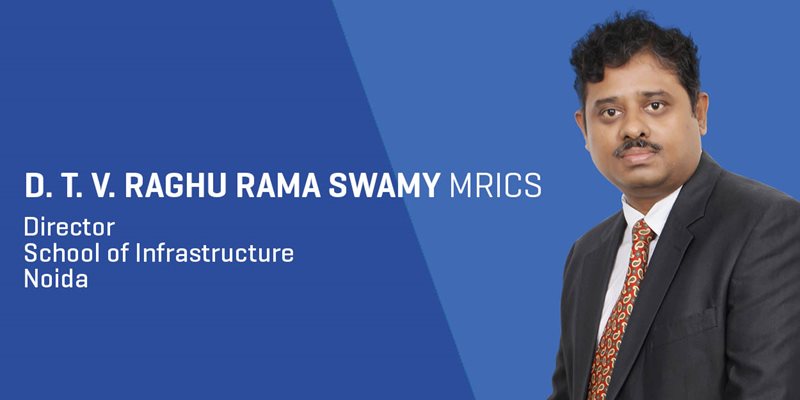DTV Raghu Rama Swamy writes about the need for management and leadership professionals to achieve long-term success.
29 February 2016
Expert Talk

The challenges of infrastructure development and service delivery are increasingly in focus for the last decade or so, as they provide the foundation for sustainable functioning of economies. Construction and allied activities form a key component of how infrastructure is developed. Infrastructure and construction sectors in India have witnessed a steep rise in growth from early 2000s in tandem with the country’s GDP growth.
The sector has slowed down in the recent past as a consequence of certain macro measures like decline in overall consumption level of the economy, and the stagnation in policy and economic reforms.
The slowdown in India’s infrastructure sector is also attributed to project delays which in turn is due to time and cost overruns, delays in land acquisition, delay in obtaining permits and clearances, etc.
In the construction industry, there are only a few companies, currently or in the past, which deliver projects on time and within the planned budget. As per the report ‘Closing the Gap: The Link between Project Management Excellence and Long-term Success by Economic Intelligence Unit, 2009’, only 6% of the surveyed companies the projects were completed on time and within budget.
However, the industry continues to attract investor and developer attention, indicating a belief in long term sustainability. In India, construction industry is already the country’s second biggest employer, and is still expected to create six times more jobs than IT-related sectors by 2022. The sector needs a huge infusion of manpower with diverse professional skill levels to cater to the burgeoning needs. It is estimated that only about 2% of the 50 million people employed in the built environment industry are professional graduates while the rest are workers.
Management professionals, though forming a very minor proportion of the manpower, contribute towards effective delivery and are sought after by the industry. There is a widespread perception in the industry that the current industry competency needs are not adequately met by the available graduate talent. Most stakeholders, government and private alike, perceive that the skill needs and the number of professionals available are grossly inadequate to cater to their immediate short term and long term needs.
Business Management and allied sector professionals perform a wide array of tasks. Spread across the structuring, procurement, financing, marketing, administration and project management activities. Managing all these issues would need a well-qualified professional management staff who understands the processes and are well trained to address the changing needs. The competencies that are required in this space, for example those listed under RICS Assessment of Professional Committee (RICS APC) or the activities that are undertaken by professional firms viz. valuations, quantity surveying etc. are not mainstreamed in the country.
Technical skills, human skills and conceptual skills are the three different abilities that managers are expected to possess. Demand for skilled infrastructure professionals such as engineers, architects, designers and managers is already high and unmet across the region amongst local and foreign companies. As only 16% of university students were studying engineering and technology in 2012-2013 in India, there is not enough student pool that is available for absorption. Leighton India’s Buildings Chief Operating Officer, Mark Griffiths, identified construction management as one of the biggest skills gap in the industry: “In Australia, they’ve had a construction management degree for a couple of decades, but this has only just been brought to India. There is a deficiency across the board, from procurement and supply chain management to equipment selection and design. The curriculum hasn’t kept up with modern advancements.”
A common complaint by most recruiters is that amongst those who do graduate, most are highly unemployable, i.e. they are not “industry ready”! India’s 2013 National Employability Report found that only 21% of its engineering graduates are actually employable! The corporates (and Government’s) ability to reap their full growth potential over the next decade will heavily depend on their ability to dramatically up-skill their employees in order to maximize demographic dividends.
More and more companies in this domain are viewing project leadership a top priority for their successful performance. The key to success is in making the connection between consistent project management practices and bottom-line results.
Projects, though vary by their size, location and projects have significant risks that need to be addressed. These are not just the technical aspects of the construction, but also relate to stakeholder management, politics and budget issues. Such important projects need executives to run them—and executives need to be geared to do it. Organisations that implement a culture of project management that values risk assessment, meanwhile, are better equipped to manage risks and minimize their impact.
“An effective risk management programme has to be an ongoing part of the project”.
It is increasingly being perceived that having project management skills as a core competency has helped companies to remain competitive during the crisis. To maintain a competitive advantage and ensure that projects generate maximum value for the company, business leaders must link every project management decision, from the choosing of projects to the way teams will measure outcomes, to the strategic goals of the organisation.
This also provides us, fraternity of RICS School of Built Environment, a unique opportunity to effectively contribute, participate and grow in this burgeoning arena. Management programs in built environment space equip professionals with skills and competencies that are required for excelling in the space.
However, what differentiates a successful professional from another is presence of soft skills. The soft skills and language is identified as a major gap amongst graduates across the service, health and infrastructure sectors. Development of these skills would also increase the global competitiveness of graduates and will lead to higher pay scales. A focus on not just technical skills, but also soft skills is key for tomorrow’s growth. Leaders who continue to focus on improving project management strategies and methodologies as the economy grows will garner the greater long-term success.